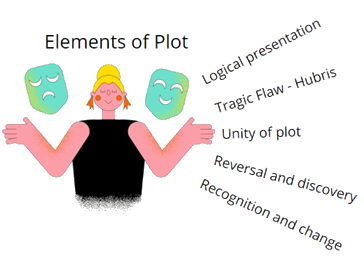Module 4: Section 4
Elements of Greek Drama: Defining "Tragedy"
Two important terms you will encounter when learning about drama are tragedy and comedy. Comedy tends to have a great deal of humor, both in terms of the dialogue (spoken lines) and the action. While there may be drama or conflict, a comedy will usually have a happy ending. Tragedy is the complete opposite. A tragedy such as Medea will typically contain events that are sad or unhappy. There will generally be a conflict that impacts one or more of the characters. Grief and pain are hallmarks of a tragedy, especially Medea. A tragedy may include a death or other significant event to one or more of the main characters.
Most of our understanding of the elements of tragedy can be taken from the writings of the Greek philosopher, Aristotle. During his lifetime, Aristotle was considered a great authority on many topics, one of them being literature. Aristotle’s book, Poetics, was written as advice to writers.
Over time, Aristotle became revered in Europe. Scholars determined that the ideas presented in Poetics should be considered the height of perfection in literature and adapted his theories into a handful of "rules" that writers should follow. Plays, whether comedic or tragic, were considered “inferior” if they violated any of Aristotle's "rules." However, Aristotle provided a very broad definition of tragedy:- A tragedy is the imitation of an action (event) that is serious, and as having magnitude, complete in itself.
- It is a dramatic, not a narrative form; with incidents arousing pity and fear, wherewith to accomplish its catharsis of such emotions.
Aristotle said that all tragedy has six parts: plot, characters, diction, thought, spectacle, and melody (music). Of these six elements, Aristotle believed plot to be the most important. According to Aristotle, characteristics of plot include: 
- Having a clear beginning, middle, and end.
- Must be long enough to allow the hero to pass through the stages of misfortune to happiness, or from happiness to misfortune.
- A unity of plot: a focus on one event in the life of the protagonist (main character), with all action corresponding to that event.
- Avoiding episodic plots that include several events in a person's life as a single story, just because they all happened to the same person.
- Events should occur in a logical fashion. Everything that happens should occur with a prooper cause from something that happened earlier.
Two important elements of plot are reversal and discovery, sometimes called recognition. Reversal involves the change of one condition to its opposite, such as a beggar being crowned king. Recognition is a change from ignorance to knowledge on the part of a character. Aristotle felt that in the very best tragedies, these two occurred at about the same time.


